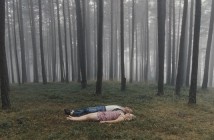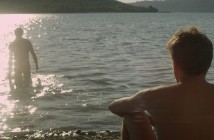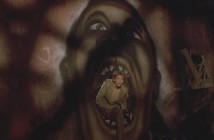
Editor’s Note: reviews this week are by Ronan Doyle and Jaime Burchardt
Appropriately enough for the month that’s in it, it’s a horror-heavy bunch this week, with rediscovered gems and new indie hits alike taking centre stage. Scaredy-cats needn’t fear though—see what I did there?—thanks to the alternate comedy options available. Both breeds have an equally wide international spread to choose from; horror aficionado or no, now’s your chance to see the world without ever even standing up.

21 & Over (Read our full review)
21 & Over quickly came and went earlier this year. It came packaged with marketing slogans like “From the creators of The Hangover” and all that jazz (this indeed is the directorial debut for Hangover writers Jon Lucas and Scott Moore). People didn’t embrace it as a whole, and now it’s on Netflix, and perhaps on a redemption journey. There’s no denying that the trailers and posters sold it as just a generic party comedy with two friends taking their third on an unforgettable night of age celebration. It definitely starts out like that. But after a certain point it leans back, and reveals that’s there more going on than meets the eye; an actual humane sub-plot. Granted it’s not subtle or elegant in any way, shape, or form… but Lucas and Moore drive it home regardless. When the dust settles, 21 & Over ends up being quite the surprise. Oh and also, it’s pretty funny. RECOMMENDED. ~JB

A Band Called Death (Read our full review)
No, not the metal band who shared their name with the subgenre to which they were so essential, though you’d be forgiven for assuming that. The subjects of Mark Christopher Covino and Jeff Howlett’s fascinating documentary, rather, are the proto-punk trio of African American brothers whose music was so ahead of its time it’s only found the success it deserved in ours. Illuminatingly told by way of interviews with the remaining two, largely concerning the lingering shadows of the absent one, A Band Called Death chronicles the tumultuous history of the unrecognised visionaries and their subsequent rediscovery by—of all people—their own kids. Centred as it is around a success that’s posthumous for its chief engineer, there’s a certain bittersweet flavour to the film, though it’s mostly with nothing but joy that his memory—and the oddly prescient view he held of his band’s future—is invoked. RECOMMENDED. ~RD

Devil
I remember being in a theater when the trailer for Devil came up. The audience seemed intrigued, until M. Night Shyamalan’s name came up to boos and laughs unanimously. Too bad, because they might have missed out on quite the ride. A bunch of seemingly random strangers are stuck in an elevator, but there’s something more to it. Horrible images keep popping up on the security monitors. People are dying. Could the Antichrist really be among them? Let’s get something clear here: Shyamalan came up with the story; Brian Nelson (30 Days of Night) wrote the actual screenplay; and directing duties went to John Erick Dowdle (the disturbingly effective Poughkeepsie Tapes). Combine those factors with an effective ensemble cast and Devil goes from potential laugh riot to the little horror movie that could, did, and owned for 80 minutes. The movie ended up being a small box office hit. Just waiting now for that cult status sticker. HIGHLY RECOMMENDED. ~JB

Graceland
Given the number of high-profile key grip gigs to his name, it’s a surprise that writer/director Ron Morales’ sophomore effort Graceland looks so unimpressive in itself. Functional in its aesthetic, at best, it’s at least a movie with a fine idea behind it, blending hints of a gangster narrative with the simple story of a father out to rescue his kidnapped daughter. The morally contentious conceit of the central character recruiting the aid of the crime boss for whom he chauffeurs by pretending the murdered girl has been kidnapped too is the strongest card in Morales’ hand, albeit one just not strong enough to support the weight of a tedious execution and trite performances aplenty. Well though Arnold Reyes may work in the lead role, his protagonist’s dilemma hasn’t half the depth it demands, nor even the benefit of being expressed by way of an exciting action thriller. SO-SO. ~RD

In Bruges
Following up on the promise of his Oscar-winning short film Six Shooter, Irish playwright Martin McDonagh made one of the finest, funniest feature debuts of recent years with In Bruges. Starring a genial Brendan Gleeson and brooding Colin Farrell as two hitmen hiding out in the eponymous Belgian city, it’s a film whose hilarity belies a brilliant dramatic underbelly, slowly exposed to impressive effect as the story plays out. McDonagh’s Oscar-nominated script is nothing short of genius, loaded with laudable lines that spare no expense in splitting sides. Ralph Fiennes’ scenery-chewing supporting turn is among the biggest delights of his jam-packed filmography, while a typically terrific Gleeson and a never-better Farrell make of their characters a magnificent modern-day odd couple. What stays most memorable about the movie, nonetheless, is less its comedy than the noirish nuance of its drama. HIGHLY RECOMMENDED. ~RD

Maniac (Read our full review)
You might not find a movie more relentless in its brutal quest this year than Maniac. Horror aficionado Alexandre Aja and longtime partner Grégory Levasseur write and produce this remake of the controversial 1980 William Lustig-directed horror gem, and they give it quite the spin for the modern age. Frank (Elijah Wood) is… off. To say he had a traumatic childhood would be putting it lightly. Is he truly looking for love, or is he nothing more than a stalker and murderer of women? Once Anna (Nora Arnezeder) comes into the equation, all those lines become blurred. Director Franck Khalfoun (P2) and cinematographer Maxime Alexandre bring us a narrative that’s not common these days. It’s refreshing, and when the madness kicks in, it’s like having a front-row ticket to a sympathetic snuff party. It’s gory, vicious, expertly crafted, and it features a flat-out brilliant performance by Wood. Maniac is a prime example of how horror remakes can become their own dark gems. MUST SEE. ~JB

Pieta (Read our full review)
Who might have known, before seeing Kim Ki-duk’s Pieta, that a movie can be transgressive to the point of tedium? The prolific South Korean auteur indulges his excesses all too freely here, giddily showing the sadistic story of a brutal debt collector whose absentee mother arrives on his doorstep without ever stopping to explore the psychosexual significance on-hand in abundance. That’s not to say that the film’s without its intellectual aspects: obviously indebted to religious artistry, the eponymous allegory hangs heavy over proceedings, though rarely with any apparent consequence. No, this is less the putrescent profundity it likes to think itself than it is puerile poppycock, taking easy oedipal cues in lieu of any substance at all. Dreary though their characters may be, the film’s major players carry themselves commendably; Kim, following suit, uses his aesthetic abilities to rise above the material in style. What a shame, then, that it’s his own. AVOID IT. ~RD

Populaire (Read our full review)
The problem with Populaire, a perfectly passable piece of fluff if ever there were one, is that it expects us to appreciate and urge on the inevitable romance between its central pairing. They, an insurance agent and the newly-hired secretary in whom he discovers extraordinary speed-typing abilities, are likeable enough in their own right, though the relationship between them is rife with patriarchal problems. It’s just not good enough; nor, it should be noted, can it be brushed aside with a shrug and a nod to the late-‘50s setting. Here is a movie that, through nothing more than its own well-intentioned desires to be light and frothy, perpetuates what it out to poke fun at. It’s a shame: albeit only a lightly-shaken sports movie formula, it’s an enjoyable enough story otherwise, excellently enlivened by the energetic work of Romain Duris and Déborah François. SO-SO. ~RD

The House of the Devil
“Slow burner” has been the name of the game with the filmography of writer/director Ti West, and his 2009 outing The House of the Devil is no different. Samantha (Jocelin Donahue) is trying to save up money to finally get her own place but she’s a few bucks short. When a high-paying babysitting job pops up on her college campus, she’s more than eager to comply. From the get-go, West builds and builds and builds up the tension like a stack of dread-themed Legos. From the gig discovery, to the intro to the house and the ‘baby’, it has everything going for it. Unfortunately, West can’t quite bring it home in the third act with the final revelation. It’s not bad, but it could leave a disappointing taste. Sometimes though, it’s not the destination, it’s the journey itself that stands out. The House of the Devil’s journey is not one to dismiss. RECOMMENDED. ~JB

Vile
“The root of violence is science without humanity” is the Gandhi quote with which debut director Taylor Sheridan—best known, perhaps, as Sons of Anarchy’s Deputy Chief Hale—opts to open Vile, a film that lives up to its name in every sense of the word. This is cinema without humanity as a route to violence, a prototypical concoction of thinly-sketched characters and a bare-bones horror conceit that acts as a shortcut to scenes of the utmost depravity. Thus we have a handful of throwaway teens kidnapped and forced to torture each other for the benefit of a nameless corporation who’ve attached hormone-harvesting machinations to their brain. If it sounds cool it shouldn’t: this is nought more than the easiest excuse to hand for a dreary indulgence in ultra-violent spectacle that’s every bit as interesting as it is original. Which, it shouldn’t be necessary to say, is not at all. AVOID IT. ~RD

Wake in Fright (Read our full review)
Re-released at last this year after four decades of infamy as the great lost film of the Australian New Wave, Ted Kotcheff’s Wake in Fright is a searing cinematic experience, an expertly engrossing and thrillingly terrifying tour through the Australian outback that gazes frankly into the dark depths of the human soul. Following disparaged city schoolteacher John Grant as he stops overnight in a mining town known as “The Yabba”, it’s a film that’s at once slow and sudden, its impact sneaking up slyly yet never not outrightly apparent either. Gary Bond’s increasingly manic performance demonstrates the same sort of evolution as will inevitably befall an audience subjected to the uncanny horrors of this narrative, materialising the primal spirit of man by way of Grant’s drink-fuelled descent into madness. Shot with a beauty nowhere to be found in its ugly story, Wake in Fright is a film utterly deserving of its elated reputation. HIGHLY RECOMMENDED. ~RD

Wrong (Read our full review)
The capacious charm of Quentin Dupieux’s Wrong is only accentuated by something as dull as this year’s semi-spinoff Wrong Cops; the absurdist French director, famed for the philosophy of “no reason” as set out in the opening scene of his breakthrough indie hit Rubber, is at his best when using that lack of reason as a means to some interesting end. Wrong, then, is his best work to date, its fantastically silly and utterly weird story of canine kidnappers and indoor storms all employed in pursuit of a simple, sweet message. Not to mention the hilarity that abounds at every turn, not least of all from William Fichtner’s delightfully airy performance as the head of the bizarre corporation who separate the depressed Dolph from his beloved dog. Dupieux’s suburban surrealism has shades of Blue Velvet, albeit rarely so horror-oriented; he, for all his black humour, is an optimist at heart, a fact the final act touts with pride. RECOMMENDED. ~RD



